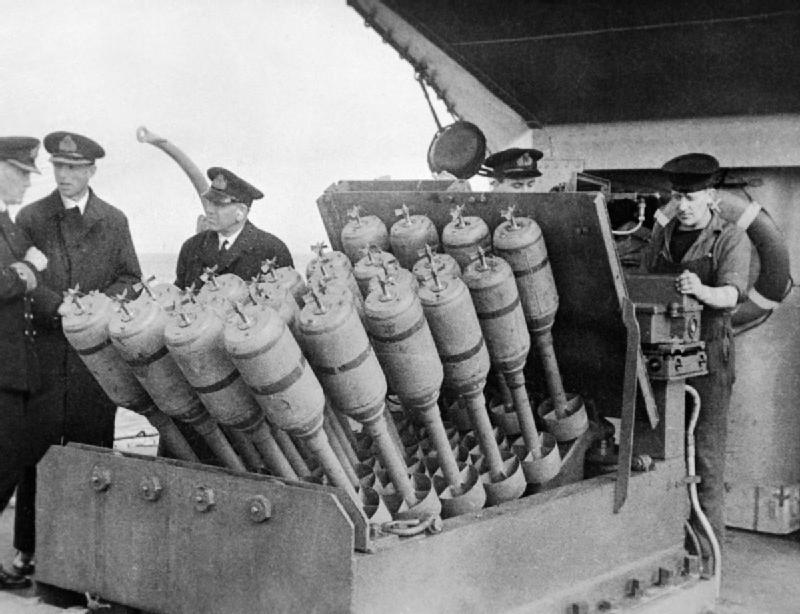You are using an out of date browser. It may not display this or other websites correctly.
You should upgrade or use an alternative browser.
You should upgrade or use an alternative browser.
Can underwater ammo explode?
- Thread starter CAPTAIN SINBAD
- Start date
Please register or login
Welcome to ScubaBoard, the world's largest scuba diving community. Registration is not required to read the forums, but we encourage you to join. Joining has its benefits and enables you to participate in the discussions.
Benefits of registering include
- Ability to post and comment on topics and discussions.
- A Free photo gallery to share your dive photos with the world.
- You can make this box go away
Some died in Germany picking up a grenade (so an UXO) underwater recently:
 scubaboard.com
scubaboard.com
Diver recovers WW2 grenade from Ossiacher See, dies in explosion
https://kaernten.orf.at/stories/3123972/ A German recreational scuba diver found the grenade. While examining his find today in shallow water it exploded and killed the diver. 53m deep lake Ossiacher See is small and beautiful (although not the most popular spot for scuba diving). Unknown to...
admikar
Contributor
There is a spring nearby my home that was used as an ammo, weapons and bodies dump since WW1. Ground shifts depending on water flow, constantly uncovering previously burried stuff. I have picked quite a lot of ammo and old weapons from there and have no problem with handling certain things like hand grenades with spoon still attached or capped hit activated hand grenade.
A lot of mortar, cannon and tank grenades in there too. If no fuze (easy to notice) I have no problem handling those too.
If spoon is missing or it is uncapped hand grenade, or primed round, I call EDU and let them deal with it
A lot of mortar, cannon and tank grenades in there too. If no fuze (easy to notice) I have no problem handling those too.
If spoon is missing or it is uncapped hand grenade, or primed round, I call EDU and let them deal with it
coldwaterglutton
Contributor
I'm pretty sure there is at least one live torpedo in U853 and the charts of the area were marked and may still be with warnings of unexploded depth charges.
There is at least two torpedoes left in the U853 and I have no reason to believe they are not live.
But much more dangerous around that wreck are unexploded hedgehogs, which were used to sink the sub. They are smaller and harder to see than the big 500 pound ash cans. There are also hedgehogs around the stern of wreck of the SS Black Point a few miles to the north, which was targeted by the Navy/CG as possibly being the 853 during the engagement.

Hedgehog (weapon) - Wikipedia

AfterDark
Contributor
That's not ammo, big difference. Ammo doesn't explode unless it's confined in a chamber that restricts the expansion of gas when the powder is detonated. Throw a metal case bullet into a campfire all you'll get is a pop. You'll find both the case and bullet in the ashes.Some died in Germany picking up a grenade (so an UXO) underwater recently:
Diver recovers WW2 grenade from Ossiacher See, dies in explosion
https://kaernten.orf.at/stories/3123972/ A German recreational scuba diver found the grenade. While examining his find today in shallow water it exploded and killed the diver. 53m deep lake Ossiacher See is small and beautiful (although not the most popular spot for scuba diving). Unknown to...scubaboard.com
If you go smacking the primer while holding the same bullet with your fingers then you will probably get burned, not quite as bad as holding a firecracker.
Yes. Some of this ordinance is triggered by magnetic forces. That is why the U.S. Navy had non-magnetic Aquamaster regulators, aluminum tanks with brass valves. If you'll look at the diver on the top, actually a U.S. Air Force Pararescue trainee at the U.S. Navy School for Underwater Swimmers in Key West, Florida in 1967, you'll see he has a black regulator. That is the anti-magnetic Navy Aquamaster, and instead of coating the parts inside with chrome plating, it was plated with gold.When wrecks sit at the bottom loaded with explosive ordnance, is there a detonation risk? Does anyone know about explosion caused by corrosion? Would torpedoes and depth charges pose a bigger risk than surface ammo that has sunk? If anyone would shed some light, Id appreciate.
The best advice is if you see it, back off and stay away. Report any ordinance you find to authorities if it hasn't already been identified.
SeaRat
Attachments
That is not necessarily true. Remember, equal and opposite reaction. If that piece of ammo is butted up against a substantial rock, the bullet is likely to come out rather fast.That's not ammo, big difference. Ammo doesn't explode unless it's confined in a chamber that restricts the expansion of gas when the powder is detonated. Throw a metal case bullet into a campfire all you'll get is a pop. You'll find both the case and bullet in the ashes.
If you go smacking the primer while holding the same bullet with your fingers then you will probably get burned, not quite as bad as holding a firecracker.
SeaRat
AfterDark
Contributor
That is not necessarily true. Remember, equal and opposite reaction. If that piece of ammo is butted up against a substantial rock, the bullet is likely to come out rather fast.
SeaRat
Unlikely since the denotation would not be confined in a chamber to built up the pressure required to do anything but pop. I've been reloading and making ammo as well as casting bullets for almost as long as I've been diving. That has allowed me to do some pretty exciting experiments.
The "pop" is of course relevant to the size of the cartridge. A .45ACP round is small, a 40MM round is quite large and if detonated in a campfire would be VERY dangerous just because of the volume of powder and the very large primer. Size does matter.
An exception to the confined in a chamber would be a metallic case black powder round like an original 45-70 or .45 colt. Black powder will explode if lit out in the open and requires very little pressure to fire a bullet unlike smokeless powder.
My black powder rifle sends a 128 grain round ball down range at 2000+ FPS with less pressure than most modern handguns would generate to do the same thing. The big guns of the battleships were black powder for the same reason, low pressure.
We keep getting off track mentioning explosives, the OP was asking about small arms ammo if I remember correctly. Torpedos, grenades' mines and such are not small arm ammo. One .303 .30/06 8mm .223 .308 round that has been sitting underwater for years isn't going to "blow up" in someone's hand anymore than a new round would if handled correctly.
To amplify this a bit, here's another discussion:Unlikely since the denotation would not be confined in a chamber to built up the pressure required to do anything but pop. I've been reloading and making ammo as well as casting bullets for almost as long as I've been diving. That has allowed me to do some pretty exciting experiments.
The "pop" is of course relevant to the size of the cartridge. A .45ACP round is small, a 40MM round is quite large and if detonated in a campfire would be VERY dangerous just because of the volume of powder and the very large primer. Size does matter.
An exception to the confined in a chamber would be a metallic case black powder round like an original 45-70 or .45 colt. Black powder will explode if lit out in the open and requires very little pressure to fire a bullet unlike smokeless powder.
My black powder rifle sends a 128 grain round ball down range at 2000+ FPS with less pressure than most modern handguns would generate to do the same thing. The big guns of the battleships were black powder for the same reason, low pressure.
We keep getting off track mentioning explosives, the OP was asking about small arms ammo if I remember correctly. Torpedos, grenades' mines and such are not small arm ammo. One .303 .30/06 8mm .223 .308 round that has been sitting underwater for years isn't going to "blow up" in someone's hand anymore than a new round would if handled correctly.
I agree about ammo underwater. Thanks for the clarification.Ammunition Facts:
Ammunition that is stored in the boxes sold by the manufacturer is not dangerous in a fire. If ignited by intense heat, the brass or plastic cartridge will burst. The particles will not travel very far. The protective clothing that firefighters wear will protect them.
However, if ammunition is stored in a metal container such as a GI .50 caliber ammo box, the ammunition can explode under the right conditions.
LOADED firearms in a house fire can "cook off", meaning the round will fire. This is a dangerous situation. The bullet has all the power as if it was fired normally. There was a case where a loaded semi-automatic rifle was in a wall rack during a fire. The heat caused the rifle to go off, and it continued to fire until the magazine was empty. One round hit a fire truck. The firefighters thought they were beign shot at, and pulled away from the scene of the fire. The house burned to the ground.

Exploding Ammunition - Is this a problem?
Residential Fires & Exploding Ammunition Without getting into the debate about our freedom to bear arms... one thing remains clear... There are a…my.firefighternation.com
SeaRat
One thing I have not seen discussed here is the different types of projectiles that exist, even in small arms ammo, like rifle cartridges. If you have something with a lead core or tungsten core, the projectile is not likely to be a problem, just the primer & powder/cordite. If you have a phosphorus core, or other exotic, which the military did use, then the projectile itself becomes a hazard. After many years in the ocean, the colored bands on the tips of the projectiles will likely be gone, so identifying them becomes an issue. Some had multiple bands, so even if you see one band that you know, there may have also been another. Unknown military munitions should be considered dangerous. Full stop.
Similar threads
- Replies
- 11
- Views
- 2,562
- Replies
- 11
- Views
- 1,161
- Replies
- 2
- Views
- 1,454




